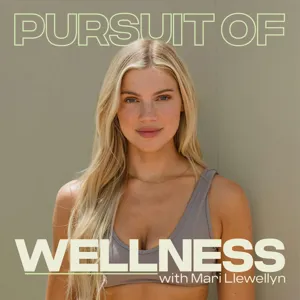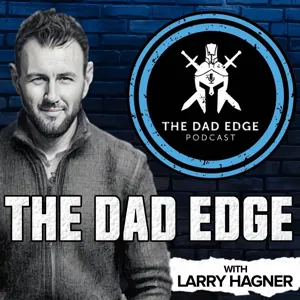Podcast Summary
Discussing Hormonal Health and Optimization: Dr. Rangan Chatterjee and nutritional therapist Angelique Panagos share insights on improving hormonal health through lifestyle changes, as Angelique shares her personal journey of overcoming health issues and becoming a specialist in the field.
Dr. Rangan Chatterjee, a medical doctor, author, and BBC television presenter, aims to simplify the complex process of getting healthy through his podcast. He believes that when we are healthier, we are happier, and that's why he's excited to discuss hormonal health and optimization with nutritional therapist Angelique Panagos. Angelique, who specializes in female health, stress, and digestion, shares her personal journey of struggling with her own health issues, including Hashimoto's and hypothyroidism, eating disorders, and hormonal imbalances. Despite visiting numerous doctors and receiving unsatisfactory answers, she realized that she needed to make lifestyle changes to improve her health. Angelique's experiences led her to become a specialist in this area and write a book, "The Balance Plan," which provides six steps to optimize hormonal health. Her story highlights the importance of taking charge of one's health and making necessary lifestyle adjustments to improve overall well-being.
The importance of being persistent and proactive in seeking answers for unexplained health symptoms: Recognizing the significance of self-advocacy, comprehensive testing, and lifestyle changes can lead to better health outcomes when dealing with unexplained symptoms.
When facing unexplained health symptoms, it's essential to be persistent and proactive in seeking answers. The speaker's experience of being diagnosed with Hashimoto's and PCOS after years of struggling with symptoms and being prescribed medications that didn't fully address her concerns, highlights the importance of advocating for oneself and seeking out comprehensive testing. Her story also underscores the significance of recognizing that some treatments may have unintended consequences, and that making lifestyle changes can be a crucial part of the healing process. Overall, the speaker's journey serves as a reminder that being informed and persistent can lead to better health outcomes.
Lifestyle changes impact hormonal health significantly: Making dietary adjustments, getting enough sleep, and managing stress can positively influence hormonal health and improve chances of overcoming conditions like PCOS
Making lifestyle and nutrition changes can significantly impact hormonal health. This was a major realization for someone in their mid-twenties who was dealing with hormonal issues and the fear of missing out (FOMO). They recognized the importance of reducing refined carbohydrates, increasing vegetables, and getting enough sleep to improve their overall health and increase their chances of becoming a parent. This shift happened early on, and it's a reminder that we have the power to make positive changes in our lives. Additionally, healthcare professionals may not always make the connection between lifestyle and hormonal health, but it's crucial to understand that insulin-driven conditions like PCOS can be influenced by diet. Stress also plays a significant role in hormonal health, as it can shift the balance between stress hormones and sex hormones. Overall, lifestyle and nutrition choices can have a profound impact on hormonal health, and it's essential to be aware of this connection.
Managing Chronic Stress for Better Hormonal Health: Relaxation techniques, breaks from work, and deep breathing can help manage chronic stress and improve hormonal health
Modern life, with its constant influx of emails, social media, and other sources of stress, is leading many of us to live in a state of chronic stress rather than the acute stress our bodies are designed to handle. This chronic stress can have negative effects on our hormonal health, as we're not giving our bodies the time they need to rest and recuperate. Some effective ways to reduce stress and improve hormonal health include setting aside time for relaxation, such as reading, taking a walk, or spending time with friends; taking regular breaks from work to eat meals without distractions; and practicing deep, belly breathing to stimulate the parasympathetic nervous system and promote relaxation. By making these simple changes, we can help put the "wild lion" of modern life back in its place and give our bodies the time they need to relax and restore.
Improve hormonal health through meditation: Meditation promotes sex steroid hormones, reduces cortisol, a simple practice for daily life, essential for optimizing hormonal health, balanced diet and lifestyle
Practicing meditation regularly can significantly improve hormonal health by promoting the production of sex steroid hormones like testosterone and estrogen, instead of the stress response hormone cortisol. This simple yet powerful practice can be incorporated into daily life, even during short moments of stress or commute. The Dalai Lama famously said, "Meditation is not a luxury, it's a necessity," and this sentiment holds true for optimizing hormonal health. Additionally, nourishing the body with the right balance of nutrients, including healthy fats, good quality protein, vegetables, and even carbohydrates, is essential for hormonal health. Remember, it's important to avoid extremes and focus on a balanced approach to diet and lifestyle.
Balancing Carbs and Fats for Optimal Health and Hormonal Balance: Focus on nourishing the gut microbiome with whole, nutrient-dense foods like starchy veggies and natural fats, while limiting refined carbs for optimal health and hormonal balance.
A balanced diet, rich in the right carbohydrates and good fats, is essential for optimal health, particularly for women with hormonal issues. The gut microbiome plays a crucial role in this balance, as it helps in nutrient absorption and hormone synthesis. Therefore, it's important to focus on nourishing the microbiome with healthy, whole foods like starchy vegetables and natural fats, while limiting refined and processed carbs. The key is finding the right balance and consistency in your diet, rather than striving for perfection. The goal should be to create a sustainable lifestyle that supports your overall health and wellbeing. Additionally, it's important to remember that there is a lot of nuance and overlap in various dietary approaches, and many advocates of different diets share similar messages about the importance of whole, nutrient-dense foods. So, rather than getting caught up in dietary labels or camps, focus on the fundamentals of a balanced diet and prioritize consistency and sustainability.
The importance of prioritizing sleep for new parents: Sleep deprivation can lead to poor food choices, decreased cognitive function, and hormonal imbalances. Prioritize sleep to improve mood, energy levels, and cognitive function.
Prioritizing sleep, especially for new parents, is crucial for overall health and well-being. Lack of sleep can lead to poor food choices, decreased cognitive function, and hormonal imbalances. The speaker's personal experience of sleep deprivation during motherhood highlights the significant impact it can have on daily life and long-term health. It's important to remember that it's a common struggle for many parents and finding a balance between caring for a young child and getting enough rest is essential. Sleep should be prioritized as much as possible, even if it means sacrificing a few minutes of productivity in the morning to get an extra half hour in the evening. The benefits, such as improved mood, energy levels, and cognitive function, are worth the effort.
Understanding Hormonal Health: Beyond Sex Hormones: Improve hormonal health by addressing sleep, nutrition, detoxification, and bowel movements to balance stress hormones, insulin, thyroid, ghrelin, and leptin. Adopt a functional approach to healthcare and consider the role of genes and epigenetics.
Hormonal health is not just about sex hormones but also involves stress hormones, insulin balance, thyroid hormones, ghrelin, and leptin. Lack of sleep, improper nutrition, and insufficient nutrients for detoxification and regular bowel movements can disrupt these hormones, leading to various conditions such as hormonal imbalances, weight issues, mood swings, and even headaches. It's essential to adopt a functional approach to healthcare, focusing on the root causes rather than quick-fix pills. Genes and epigenetics offer the ability to change what's happening in the body, and giving it the necessary tools for optimal functioning is key. If you're a woman struggling with hormonal issues or a concerned loved one, consider sharing the principles discussed in this podcast and applying them to see improvements. While hormonal treatments may be necessary, focusing on the root causes can lead to better overall health.
Managing Hormonal Issues: 80% Lifestyle, 20% Medication: Making lifestyle changes can significantly improve hormonal issues, reducing the need for medication. The 80-20 rule, where 80% of the time you stick to healthy habits and 20% of the time you allow flexibility, can be effective.
While medication can help manage certain health conditions, such as Hashimoto's thyroiditis, making lifestyle changes can significantly improve symptoms and reduce the need for medication. The 80-20 rule, where 80% of the time you stick to healthy habits and 20% of the time you allow yourself some flexibility, can be an effective approach. For example, a woman with underactive thyroid, despite taking replacement hormones, felt better after changing her diet, eliminating potential triggers like gluten, and learning to meditate. Over two years, she reduced her medication intake and felt better than ever before. This case illustrates the importance of considering lifestyle factors in managing hormonal issues, even if a condition cannot be cured.
Eating more vegetables supports hormonal health: Incorporating more veggies into meals helps detoxify body, balance hormones, and promote gut health. Small changes, like adding greens daily, can lead to big improvements.
Making dietary changes can significantly impact hormonal health. Specifically, consuming more vegetables on a daily basis can help detoxify the body, support hormone balance, and promote gut health. This doesn't require a strict detox or extreme diet changes, but rather incorporating more dark green leafy and cruciferous vegetables into meals. Additionally, maintaining blood sugar balance through daily movement and moderation in food choices, such as avoiding refined carbohydrates and sugars, can also contribute to hormonal health. Overall, small, consistent lifestyle changes can lead to big improvements in hormonal balance.
Incorporating regular strength training into daily routine is essential: Start small, make it fun, prioritize self-care, and model healthy habits for overall health and well-being
Incorporating regular strength training into your daily routine, whether at home or at the gym, is essential for overall health and well-being. Dr. Mariam Nemmouche emphasizes the importance of starting small, even with no equipment, and making it a fun and engaging experience for both adults and children. Additionally, taking time for self-care and relaxation, including limiting screen time, is crucial for restoring the body and mind. Dr. Nemmouche shares her personal experiences of the positive impact of regular exercise on her fertility journey and encourages parents to prioritize movement and model healthy habits for their children.
Advocating for Prioritizing Health Amidst Busy Lives: Prioritize sleep, movement, balanced blood sugar, and veggies for better health. Hormonal balance is key, learn from Angelique's 'The Balance Plan'.
Promoting health is a constant effort and not a perfect process. Angelique and Dr. Chatterjee, both advocates of healthy living, acknowledged that they are not immune to the challenges of maintaining a balanced lifestyle in today's fast-paced world. They emphasized the importance of prioritizing sleep, getting enough movement, balancing blood sugar levels, and increasing vegetable intake as simple yet effective steps towards better health. Angelique also shared her excitement about her book, "The Balance Plan," which aims to help readers understand the importance of hormonal balance and offers practical tips to improve overall well-being. The podcast concluded with Dr. Chatterjee expressing his gratitude to Angelique for sharing her insights and encouraging listeners to subscribe, rate, and share the podcast to help spread the message of health and wellness.





